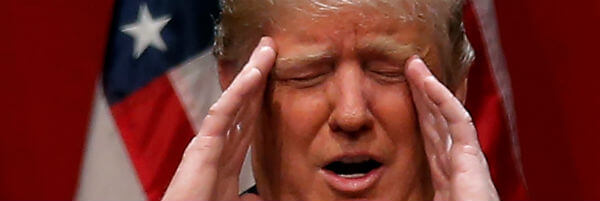
This is part of what Donald Trump said in an interview broadcast on Fox News today:
CHRIS WALLACE, FOX NEWS ANCHOR: According to The Washington Post, the CIA has concluded that Russia intervened in the election to help you win the presidency. Your reaction?
DONALD TRUMP, R-PRESIDENT-ELECT: I think it’s ridiculous. I think it’s just another excuse. I don’t believe it… No, I don’t believe that at all.
WALLACE: You say you don’t know why. Do you think the CIA is trying to overturn the results of the election —
TRUMP: No, I don’t think —
WALLACE: — somehow to weaken you in office?
TRUMP: Well, if you look at the story and you take a look at what they said, there’s great confusion. Nobody really knows.
[…]
WALLACE: You’ve said repeatedly you don’t believe the intelligence community’s analysis that the Russians were involved.
TRUMP: Take a look. They’re not sure. They’re fighting among themselves. They’re not sure.
WALLACE: But the question is, these are the folks you’re going to have to rely on to know what’s going on in the world?
TRUMP: Of course, we’re going to make changes, you know, at the top. I mean, we’re going to have different people coming in because we have our people, they have their people. And I have great respect for them.
But if you read the stories, the various stories, they’re disputing. And certain groups don’t necessarily agree. Personally, it could be Russia. It — I don’t really think it is. But who knows? I don’t know either. They don’t know and I don’t know.
[…]
WALLACE: President Obama just ordered a full review of Russia’s involvement, hacking in the election. And Democrats are now calling for hearings.
Do you think this is part of an effort to undercut you?
TRUMP: Well, it could be. I think President Obama’s been terrific. He’s been very respectful of the process and everything else. So, I saw that.
But — and I want it too. I think it’s great. I think — I don’t want anyone hacking us. And I’m not only talking about countries. I’m talking about anyone, period.
But if you’re going to do that, I think you should not just say Russia, you should say other countries also, and maybe other individuals.
In summary, Donald Trump thinks that the CIA’s claim that Russia intervened to help him win the election is ridiculous. He doesn’t believe it at all.
But he also thinks Russia could have hacked the election and says “I don’t know.”
Tucked inside this contradictory mix of disbelief and doubt is Trump’s overriding conviction: that if he is ever compelled to publicly acknowledge that Russia played an instrumental role in his victory, a fatal blow will have been struck at the legitimacy of his presidency.
No wonder he chooses to get as few intelligence briefings as possible.
Trump is more concerned about avoiding hearing information he doesn’t want to hear than he desires to be apprised of current threats to the national security of the United States.
In an era during which both politicians and the public have become hyperfocused on overstated threats from terrorism, what is actually now in jeopardy is American democracy itself.
Fortified borders and expanded military forces will provide no protection if opponents of democracy are already exerting their influence at the heart of government.
Trump’s insistence that no one really knows whether Russia intervened is a position that will nevertheless resonate in many quarters both because of widespread skepticism about the reliability of the CIA and because of the simple fact that the agency has thus far refrained from making clear exactly how much (or how little) it knows.
Nevertheless, no one should confuse the non-disclosure of evidence with its non-existence.
President Obama’s order that a report be completed before he leaves office, nevertheless suggests the possibility that President Trump will feel compelled to acknowledge the report’s findings.
If he doesn’t, it’s unlikely the report will show up on Wikileaks.
Even so, the more earnestly Trump buries the report’s conclusions, the more reasonably we can assume they must be explosive.
And the more explosive the facts are, the more likely that sooner or later they will become public knowledge.
* * *
Stay informed. Click below to sign up for daily email updates from War in Context:


I see this as the take-away:
“Of course, we’re going to make changes, you know, at the top. I mean, we’re going to have different people coming in because we have our people, they have their people.”
PW notes that “Trump is more concerned about avoiding hearing information he doesn’t want to hear than he desires to be apprised of current threats to the national security of the United States.” And he’s now declared openly how he’s going to achieve this goal. He won’t even need the firing squads or the gulag.
Of course every administration makes political appointments. President Obama handed out ambassadorships as though their primary purpose was for rewarding campaign donors.
But when Trump talks about “our people” he’s describing the formation of a regime in which the guiding principle is loyalty. Reward the loyal and punish the disloyal.
And if the day comes when dissent outside the regime becomes too loud, that’s when the dogs of the alt-right get unleashed to impose “order” on the streets.